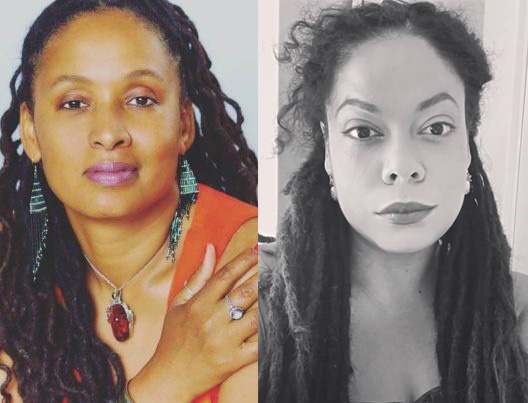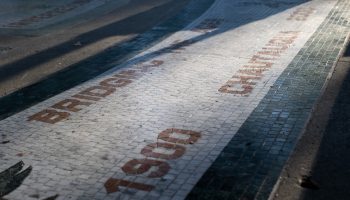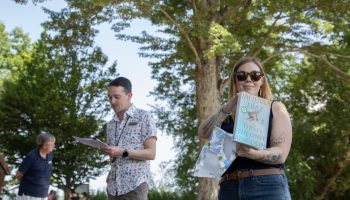
In Week Eight workshops at the Chautauqua Writers’ Center, participants will discover the intricacies of building a poem and dig into their heritage through narrative storytelling.
Joy Priest will lead “The Poem’s Architecture” and Shonda Buchanan will lead “Writing Your Cultural Heritage.” Both workshops are available through Special Studies. Priest and Buchanan will share in the Chautauqua Writers’ Center Faculty reading at 3:30 p.m. Sunday in the Hall
of Philosophy.
With a background in journalism, Priest investigated Chautauqua’s website in advance of her workshop.
“It looks like an adult lake summer camp. … I’m excited,” she said.
Priest is the author of HORSEPOWER and was selected by the 19th U.S. Poet Laureate Natasha Trethewey was the winner of the Donald Hall Prize for Poetry, and the editor of Once a City Said: A Louisville Poets Anthology. She is the recipient of a 2021 National Endowment for the Arts Fellowship, the Inprint Paul Verlaine Prize in Poetry, and the Stanley Kunits Memorial prize from American Poetry Review. She is currently an assistant professor of African American and African diasporic poetry in the University of Pittsburgh’s Master of Fine Arts Writing Program.
Priest has taught university students, community members and incarcerated juvenile girls and adult women. Throughout her career as an instructor, she has embraced new pathways of teaching.
“I got bored of the usual, basic, poetic element workshops I was doing, and I started to move in the direction of demystifying some of the questions I have gotten over the years,” Priest said.
Just as different buildings serve different purposes, Priest wants to examine the architecture of poems as guiding the reader through a unique experience.
“When we sit down to write the poem, I think of it as, how do you want to tour the reader through the experience? If you’re a docent in a museum, which room do you want to take them through first?” Priest said.
Leading with her own vulnerability through examples in the workshop, she looks forward to seeing what participants bring and hopes that they leave with at least two solid poems. From opening lines to caesuras to repetition, Priest looks forward to navigating intentional structure in poems.
“I think about everything on the page as a kind of tool for the poet,” she said.
On Sunday, Priest plans on reading from HORSEPOWER and her upcoming book surrounding the ecological crisis from the perspective of a colonial encounter of the Americas. She will be joined on the podium with Buchanan, leading the prose workshop for Week Eight.
Buchanan is a two-time Pushcart Prize and Best of Net nominee and author of three poetry collections, Who’s Afraid of Black Indians?, Equipoise: Poems from the Goddess Country and The Lost Songs of Nina Simone. Her award-winning memoir Black Indian was chosen by PBS News Hour as a “Top 20 Books to Read to Learn about Institutional Racism.” She is a professor in the creative writing department at Western Michigan University and Alma College’s Master of Fine Arts program in creative writing.
Buchanan was born in Kalamazoo, Michigan, and moved to Los Angeles at 18. While there, she began wondering about her heritage and past.
“I lived in L.A. for 18 years, and that’s when I really started looking back to say, ‘So who are those Indigenous folks?’ I mean, I know we’re labeled ‘Black,’ but who are those folks that we came from in that Michigan area?” Buchanan said.
Buchanan is a descendant of Europeans, the Mende people of Sierra Leone, and the Coharie, Choctaw and Eastern Band of Cherokee Indians of North America. Her ancestry and family informs her heritage.
“I’m always harkened back to my upbringing, to my family, writing about the land, writing about how the land created who we are … how race and raciality, segregation and those kinds of things created us,” she said.
During this week’s class, while unpacking one’s heritage, Buchanan encourages participants to recall their own memories but also non-memories — memories of family members passed down through storytelling.
“I like to call them the bones that are writing back … the vertebrae,” Buchanan said. “They help us stand up and remember things in the past and make them relevant to the present and our lives.”
Building that vertebrae begins with research. Buchanan encourages writers to talk with their eldest family members and capture their stories.
“There’s a lot of digging and digging and digging that goes on with this kind of writing,” she said. “That also will help fill in the memory pieces that you don’t have.”
Through her workshop, Buchanan wants to encourage participants to expand their minds to the boundaries of culture and witness what norms inform their day-to-day lives.
“Culture is not just singing and drumming and dancing,” Buchanan said. “Culture is image and mannerisms and colloquialisms and how we look at each other in our family — what we’ve inherited.”




